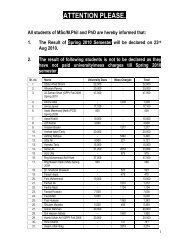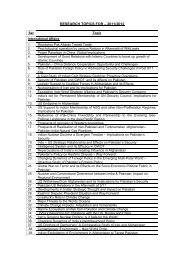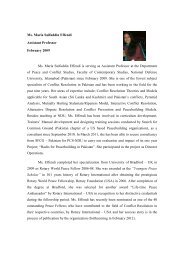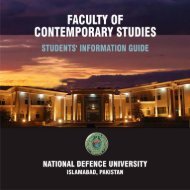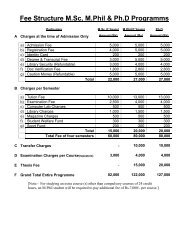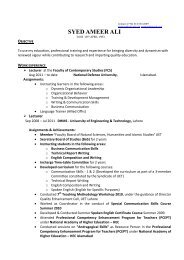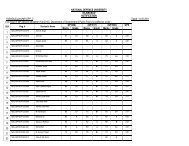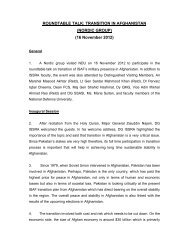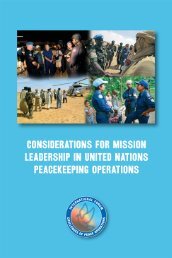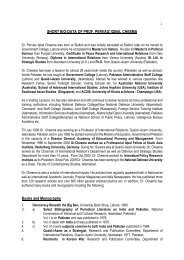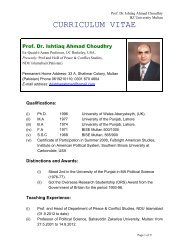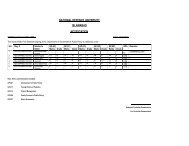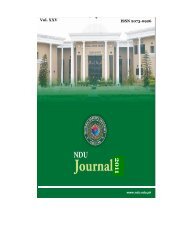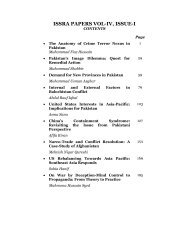OPINION Vol.1, No.1 June 2013 - National Defence University
OPINION Vol.1, No.1 June 2013 - National Defence University
OPINION Vol.1, No.1 June 2013 - National Defence University
You also want an ePaper? Increase the reach of your titles
YUMPU automatically turns print PDFs into web optimized ePapers that Google loves.
PART- IV<br />
FUTURE AFGHAN SCENARIOS AND THEIR IMPLICATIONS FOR PAKISTAN<br />
The American plans of bringing about peace in the war torn Afghanistan are under high strain.<br />
The way forward is actually now the way out. Through a scenario building exercise, an effort has been<br />
made to arrive at a probable set of scenarios for post 2014 Afghanistan.<br />
Imperatives<br />
Drivers<br />
Political<br />
A meaningful dialogue between the US/Afghan government and Taliban / Hizb-e-Islami/other<br />
factions on power sharing between Pashtuns and Tajiks, US versus Taliban; Afghan constitution<br />
and US foot print in Afghanistan.<br />
Good Governance and Rule of Law.<br />
Security<br />
Capacity building of ANSF.<br />
ISAF drawdown (in depriving the insurgency of their main justification).<br />
Use of smart power, in terms of generating incentives for the Taliban through greater share in<br />
power and other means with ultimate aim of raising their stakes in peace and stability.<br />
Socio - Economic<br />
Growth and sustenance of economy.<br />
Socio-economic development.<br />
Foreign Direct Investment (FDI).<br />
Cultural dynamics (non-interference in cultural matters).<br />
There are political, strategic, social, economic and cultural drivers, which are and will play a<br />
crucial role in shaping the future of Afghanistan. Interplay of proportionate and combined effects of<br />
fusion of selected drivers i.e. governmental policies and insurgent policies given in succeeding<br />
paragraphs is likely to shape different scenarios.<br />
Governmental Policies<br />
US. Perceived change in the US policy towards politico-economic development from military<br />
centric approach and engaging Taliban for a negotiated settlement reflects a paradigm shift.<br />
Afghanistan. Shift in power sharing arrangement by current Afghan government as an outcome<br />
of reconciliation process, resource sharing arrangement and behaviour of next Afghan<br />
government will facilitate the stability in Afghanistan.<br />
Pakistan. Role in helping create conducive conditions for a grand intra-Afghan settlement.<br />
Insurgents Policies<br />
Taliban. From adopting a rational policy to continue fighting.<br />
Al-Qaeda. Al-Qaeda has lost its influence and carries only symbolic value.<br />
Haqqani Group<br />
Other Groups<br />
Prevailing Trends<br />
Various discernible trends in different domains having pronounced bearing on the contours of<br />
Afghanistan are:-<br />
Politico – Diplomatic<br />
US will keep low footprint albeit high influence, post 2014.<br />
<strong>OPINION</strong> <strong>Vol.1</strong> <strong>No.1</strong> 85 <strong>June</strong> <strong>2013</strong>



